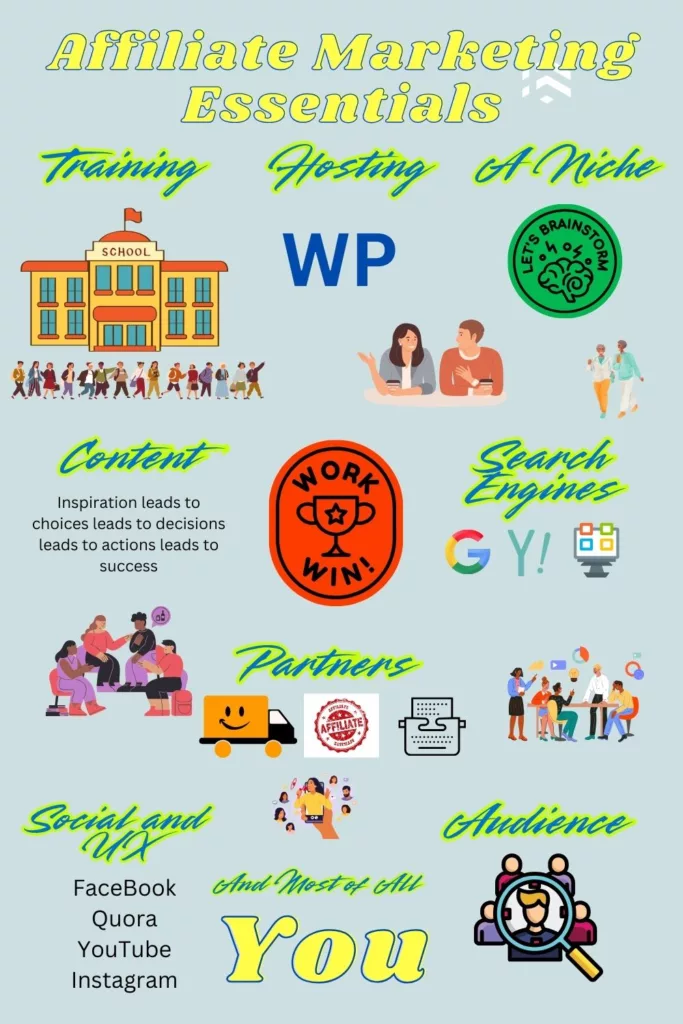
Finding the right online business starts with you. No kidding, right?
Seriously – knowing what makes you tick and where your strengths lie can make all the difference. If you pour time and energy into a venture, you’d better make sure it’s something that lights you up inside.
When you’re passionate about something, everything feels less like work and more like fun.
Speaking of fun, don’t go away if this article is too long for you because I have a free offer for you at the end. It is a free peek at the business I recommend most. Please don’t miss it!
It’s a lot easier to do what interests you, whether fixing up old bikes, dissecting business opportunities, making eco-friendly products, or helping others achieve their fitness goals.
Skills. Everyone’s got them, but do you know which of yours could be perfect for an online business?
You can find out by taking a piece of 8-1/2×11 paper and writing a list of everything over your life that made you smile inside.
Was it that Matchbox car you wanted and got for your birthday, the treehouse you built, seeing the party you planned work out perfectly, or maybe the 5K you ran and did your personal best in? Whatever it was, it could translate into something big for you.
Alright, passions and skills are sorted. Now, connect the dots.
By matching what you love with what you’re good at, you’ll set the stage for a business that’ll not only thrive but also bring you joy daily. And who knows, it might just be your best decision ever.
Going Deeper into Market Research
You’ve got a solid idea of your passion and skills, but it’s time to see if the world is ready for your business. Market research is what you need to guide you through the process.
Market demand is your top priority. You might have the next big idea, but it will not take off if nobody is interested.
Use online tools and platforms to snoop around: Google Trends, forums, and social media discussions are gold mines for gauging what people care about.

With demand identified, eye the competition. You don’t want to copy others, but understand what they do and how you can do it better—your unique style, just better. Tools like SEMrush or Ahrefs can give you a peek at the competition’s moves.
Keeping up with trends is vital. This doesn’t mean jumping on every fad that passes by but instead learning to spot enduring shifts. Predictive tools and social listening are your allies here.
Here are a few social platforms you can use to keep up with trends:
- TikTok: Known for its viral short-form videos and trends.
- Instagram: Popular for visual content and influencer trends.
- Twitter (X): Great for real-time updates and trending topics.
- Facebook: Offers a mix of news, trends, and community updates.
- YouTube: A hub for trending videos and content creators.
- Pinterest: Ideal for discovering trends in fashion, home decor, and more.
- Reddit: Has various communities (subreddits) focused on different trends.
- Snapchat: Popular among younger audiences for quick, trendy content.
- LinkedIn: Useful for professional trends and industry news.
- Lemon8: A rising platform for user-generated content and trends.
By truly understanding what your potential customers want, you set your online business on a path to success.
Exploring Business Models and Ideation
With your passions mapped out and the market clearly in view, let’s get into the nuts and bolts of business models. Different strokes for different folks, so finding the right fit is crucial.
Before we move on, let’s get one thing straight. I am NOT trying to be a buzzkill. Online business is fantastic, okay?
BUT! There are downsides, and I will exhaustively list them for you to see and consider before jumping headfirst into a business you might eventually dislike.
I promise I’m not an ogre, and everything has upsides, which I will also discuss.

Moving on…
E-commerce is a hot topic. It’s simple: You set up an online store and sell products. You could sell anything from handmade jewelry to digital gadgets. The key is picking the right products and an audience that clicks with your vibe.
The Upside
E-commerce offers global reach, allowing businesses to sell products to customers worldwide. It operates 24/7. Startup costs are generally lower compared to brick-and-mortar stores. Automation tools simplify inventory management, order fulfillment, and customer support. Data analytics provide valuable insights into customer behavior, enabling personalized marketing and improved sales strategies.
Additionally, e-commerce platforms offer scalability, allowing businesses to grow quickly without physical space or local demand constraints. These benefits make e-commerce attractive for entrepreneurs seeking flexibility, efficiency, and growth potential.
Negative Aspects of E-Commerce and Why They Are Downsides

High Competition:
E-commerce is saturated with businesses, making it difficult for newcomers to stand out.
High competition often leads to price wars, reduced profit margins, and increased marketing costs.
Dependence on Technology:
E-commerce businesses rely on websites, servers, and digital tools to operate.
Any technical failure, cybersecurity breach, or downtime can halt operations and damage reputation.
Lack of Personal Interaction:
Customers cannot physically see, touch, or try products before purchasing.
This can lead to customer dissatisfaction, higher return rates, and reduced trust in the brand.
Shipping and Logistics Challenges:
Delivery delays, lost packages, and high shipping costs are common problems.
These issues can frustrate customers, damage brand reputation, and reduce repeat purchases.
Security and Privacy Risks:
Handling customer data exposes businesses to cybersecurity threats and data breaches.
A breach can result in financial losses, legal consequences, and loss of customer trust.
High Return Rates:
E-commerce tends to have higher return rates compared to physical retail.
Processing returns is costly and time-consuming, eating into profits.
Difficulty in Building Brand Loyalty:
Customers can easily switch to competitors with a click.
Retaining customers requires constant marketing efforts, discounts, and loyalty programs, increasing operational costs.
Regulatory and Taxation Challenges:
E-commerce businesses must comply with international laws, taxes, and regulations when selling globally.
Dealing with these legal frameworks can be complex, time-consuming, and costly.
Product Quality Inconsistencies:
Suppliers or manufacturers might deliver subpar products.
Poor product quality can harm customer satisfaction and brand credibility.
Cart Abandonment:
Many customers abandon their carts during the checkout process.
This represents lost sales opportunities and requires ongoing optimization of the purchasing process.
These downsides pose unique challenges that e-commerce entrepreneurs must proactively address to build a sustainable and successful business.
Next…
Then there are service-based gigs. Maybe consulting is your thing, or you’re a pro at fixing people’s tech woes. Done right, services can be a rewarding option that matches your strengths.
While a service-based business might sound rewarding, let’s look at its advantages and disadvantages.
The Ups
Service-based businesses offer several advantages, including low startup costs since they often require minimal equipment or inventory, if any. They are highly flexible, allowing providers to choose their own schedules, choose clients, and work remotely. Personal expertise and skills are the primary assets, making starting easier without heavy financial investment.
Service businesses often have high profit margins. They also foster strong client relationships, leading to repeat business, referrals, and long-term partnerships.
Additionally, service offerings can be tailored to individual client needs, creating opportunities for premium pricing and differentiation in competitive markets.
These factors make service-based businesses appealing to entrepreneurs who want autonomy and a direct connection with their customers.
Downsides of Service-Based Gigs Like Consulting

Time-Intensive Work:
Consulting relies heavily on trading time for money.
There’s a cap on how many clients you can serve and hours you can bill daily, limiting income scalability.
Income Instability:
Income often depends on acquiring new clients or retaining existing ones.
A lack of recurring revenue or a sudden client drop-off can cause financial instability.
Client Dependency:
A few high-paying clients can make up a large portion of your income.
Losing one key client can significantly impact your earnings and workload.
Scope Creep:
Clients may continuously request work outside the original agreement without additional payment.
It can lead to burnout, resentment, and reduced profitability.
High Competition:
The consulting field is crowded with freelancers, agencies, and experts.
Standing out and justifying your rates can be challenging.
Client Expectations Can Be Unrealistic:
Some clients may expect immediate results or miracles.
Managing these expectations can be exhausting and harm your reputation if results fall short.
No Passive Income:
Unlike product-based businesses, income stops when you stop working.
This creates pressure always to stay active and prevents true financial freedom.
Difficult to Scale:
Scaling a consulting business often requires hiring staff or creating digital products.
Expanding adds complexity, overhead costs, and management responsibilities.
Emotional Labor:
Consulting often involves managing clients’ emotions, expectations, and frustrations.
This emotional burden can be draining over time.
Marketing & Lead Generation Are Constant Needs:
Consultants must constantly market themselves and generate new leads.
Marketing efforts take time and money, and success isn’t always guaranteed.
Knowledge Dependency:
You are the product in a consulting gig scenario, and your value depends on your expertise.
If you don’t keep updating your skills and knowledge, your services can quickly become outdated.
Payment Delays:
Clients might delay payments despite completed work.
Cash flow issues can arise, creating financial stress.
While consulting can be highly rewarding, these challenges highlight the importance of setting boundaries, diversifying income streams, and managing clients and time effectively.
Digital products are another exciting avenue. Got a knack for graphic design? Create and sell digital downloads. Or maybe you’re an expert in a particular field? E-books or online courses are a brilliant way to share your knowledge—and earn while you’re at it.

What’s Good About Them
Digital products have low production and distribution costs because there’s no need for physical inventory, shipping, or warehousing. Once created, digital products—such as eBooks, online courses, software, or templates—can be sold repeatedly without significant additional expenses, allowing for high profit margins.
ClickBank is a purveyor of a multitude of digital products. I digress.
They are also highly scalable, as a single product can reach a global audience with minimal effort. Automation tools enable seamless sales, delivery, and customer support, reducing operational workload.
Additionally, digital products provide passive income opportunities, as they can generate revenue long after their initial creation. These benefits make digital products ideal for those seeking financial leverage, scalability, and flexibility.
What is Not So Good About Them
High Competition:
The digital product market is oversaturated with eBooks, courses, and templates.
Standing out requires exceptional marketing, branding, and often high advertising costs.
Intellectual Property Theft:
Digital products are easy to copy, share, or pirate without authorization.
Unauthorized distribution can lead to lost revenue and reduced perceived value.
Perceived Value Can Be Low:
Customers often expect digital products to be cheaper or even free.
Pricing digital products appropriately while convincing customers of their value can be challenging.
Dependence on Technology:
Digital products rely on hosting platforms, payment gateways, and delivery systems.
Technical issues, server downtime, or payment failures can disrupt sales and customer satisfaction.
Difficult to Build Trust:
Customers can’t physically inspect a digital product before purchase.
Lack of tangible proof may lead to skepticism and hesitation to buy.
Customer Support Can Be Time-Consuming:
Digital product buyers often require technical assistance or clarification.
Providing ongoing support can become time-consuming and eat into profits.
Ever-Changing Market Trends:
Digital products can quickly become outdated, especially in tech or education niches.
Constant updates and improvements are required to keep products relevant.
Refund Requests and Chargebacks:
Digital products are often subject to high refund rates or payment disputes.
This can create financial instability and administrative headaches.
Marketing Dependence:
Success heavily depends on strong marketing strategies and consistent promotion.
Without effective marketing, even high-quality digital products may fail to gain traction.
Initial Creation Time and Effort:
High-quality digital products often require significant time, research, and expertise and can quickly become outdated, especially in tech or education niches.
The upfront workload can be intense, with no immediate return on investment.
While digital products offer scalability and profit potential, overcoming these challenges requires strong marketing, customer support systems, and protective measures against piracy.
Affiliate marketing is all about partnerships. You are a matchmaker between products and customers. By championing products you love, you earn a slice of the sales pie without the logistics hassle.
The Wonderful Aspects of Affiliate Marketing

Affiliate marketing offers several compelling advantages over other online business models, making it attractive for entrepreneurs like you (and me).
It requires minimal startup costs, as there is no need to create products, manage inventory, or handle customer service. Affiliates can earn commissions by promoting existing products or services from trusted brands.
The business is highly flexible and can be operated anywhere with an internet connection. It offers a passive income potential through evergreen content and automated systems.
Affiliates also benefit from scalability, as a single piece of well-optimized content can generate income repeatedly over time.
Additionally, the risk is relatively low, as affiliates are not responsible for product failures, refunds, or logistics. These factors make affiliate marketing appealing for individuals seeking financial freedom, flexibility, massive scalability, and a low-risk online income stream.
Check it out by clicking on this banner.

Even Affiliate marketing isn’t Completely Wonderful
Income Instability:
Affiliate income can be inconsistent.
Earnings depend on factors like market trends, seasonality, and algorithm changes, making financial planning challenging. With its various upgrades, Google has destroyed many marketers’ dreams more than once. If you get into the business, you will hear about it repeatedly.
High Competition:
Popular niches are often overcrowded with seasoned marketers and large companies.
Standing out in search results or social media platforms can be difficult without significant effort or investment. That’s why narrow niche choices are so important.
Dependence on Third Parties:
Affiliates rely on merchants and affiliate platforms to track sales and issue payments. It’s crucial to pick an excellent training platform as a partner.
Any commission structure changes, tracking system, or platform policy can directly impact earnings.
Commission Cuts and Program Changes:
Merchants can reduce commission rates or even shut down affiliate programs unexpectedly.
Affiliates have no control over these changes and may face sudden income loss.
No Control Over Product Quality or Customer Service:
Affiliates do not influence the product itself or how customer complaints are handled.
Poor product quality or customer experiences can damage your credibility and trust with your audience.
Delayed Payments:
Many affiliate programs have payout thresholds or delayed payment cycles.
Cash flow can become unpredictable, especially for those relying on affiliate earnings as their primary income source.
SEO and Algorithm Dependency:
Much of affiliate traffic relies on search engine rankings or social media algorithms.
Algorithm changes can instantly reduce traffic and sales, with little control over recovery.
Content Creation is Time-Consuming:
High-quality content, such as reviews, tutorials, or comparison articles, takes significant time and effort.
Results are not immediate, and months of work might yield little to no return initially.
Legal and Compliance Challenges:
Affiliates must adhere to legal requirements, such as disclosing affiliate links.
Failure to comply with regulations can lead to penalties or removal from affiliate programs.
Trust-Building is Critical:
Audiences are becoming more skeptical of affiliate links and recommendations
Building and maintaining trust requires transparency, consistent value delivery, and genuine recommendations.
While affiliate marketing offers low startup costs and passive income potential, its downsides highlight the need for strategy, adaptability, and a focus on long-term relationship-building with your audience. Happily, a great training platform eliminates most of these downsides.
Subscriptions offer another interesting model where recurring revenue is king. Whether it’s a monthly box of gourmet snacks or an online club with exclusive content, subscriptions create a stable, predictable income flow.

Subscribe and Prosper
Subscription-based business models offer numerous advantages, including predictable and recurring revenue, which provides financial stability and makes long-term planning more manageable.
They foster stronger customer relationships through ongoing engagement, increasing lifetime value and brand loyalty.
Subscriptions also allow businesses to gather valuable customer behavior and preferences data, enabling personalized experiences and strategic decision-making.
Additionally, the recurring revenue model reduces the pressure of constantly acquiring new customers, shifting focus toward retention, and delivering consistent value. With digital automation tools, billing, content delivery, and customer support can be streamlined, making subscriptions a scalable and efficient business model for both digital and physical products.
Subscribe and Flounder
Subscriber Churn:
Customers may cancel their subscriptions after a short period.
High churn rates can make maintaining a stable revenue stream difficult and require constant acquisition of new customers.
Content or Value Fatigue:
Over time, subscribers may feel they are no longer receiving enough value to justify the recurring cost.
Retaining customers requires continuous value delivery, which can be resource-intensive.
Payment Failures:
Credit card expirations, insufficient funds, or payment gateway errors can interrupt recurring payments.
Payment failures can result in involuntary churn and lost revenue.
Increased Customer Expectations:
Subscribers often expect consistent updates, premium content, or ongoing support.
Meeting these expectations requires continuous effort and investment, which can strain resources.
Pricing Sensitivity:
Small price increases may lead to significant customer backlash or cancellations.
Pricing adjustments must be carefully managed to avoid losing long-term subscribers.
Market Saturation:
Many industries are flooded with subscription services, from software tools to streaming platforms.
Customers may suffer from “subscription fatigue” and be unwilling to commit to additional recurring payments.
Difficulty in Initial Acquisition:
Convincing customers to commit to a recurring payment can be harder than selling a one-time product.
Effective onboarding and value demonstration are essential, which adds complexity to marketing efforts.
Heavy Reliance on Retention Strategies:
The success of a subscription model depends largely on customer retention.
Businesses must invest heavily in retention strategies, such as loyalty programs, regular updates, and excellent customer support.
Cancellations Can Happen Anytime:
Most subscription services allow customers to cancel easily.
This lack of long-term commitment makes revenue forecasting more difficult.
Operational Complexity:
Managing recurring billing, customer databases, and usage analytics requires robust systems and oversight.
These systems can be costly and require ongoing technical support.
While subscription models offer predictable revenue and long-term customer relationships, these challenges highlight the importance of customer retention, consistent value delivery, and proactive management of churn and payment issues.
We Made It!!!
So, here are several pathways to the business of your dreams. The part that makes it work is choosing the one that makes sense to you regarding the commitment you are willing to make to it, the learning curve, how much customer contact you want, and so on.
In other words, borrowing a fancy term from today’s more enlightened crowd, how does a particular business resonate with you? How does it align with your personal passions? Once you figure that out, scaling and growing that business becomes less of a hustle.
Establishing an Online Presence
Going online with your business means setting up a strong footprint.
A professional website is often your first interaction with potential customers, so it better be good!
It doesn’t have to be fancy, but it should be clear, easy to navigate, and reflect your brand’s vibe.
Platforms like WordPress or Shopify help you build excellent sites, even if coding isn’t your thing.
Next up is social media. It’s not just about posting cute cat pics (though that helps!) but engaging and growing your audience. Whether tweeting up a storm or developing an eye-catching Instagram feed, each platform offers unique ways to connect with your crowd.
Content marketing is a weapon.
Blogs, videos, podcasts—whatever your style, content keeps people coming back for more and makes you appear to be an expert in your field.
Where?
- YouTube is best for long-form videos, tutorials, product reviews, and educational content. It works because it reaches a massive global audience, has evergreen content potential, and has monetization options.
- TikTok is best for short, engaging, and entertaining video content. It has high virality potential, especially for creative and trend-driven content.
- Instagram works best for Reels (short videos), Stories, and IGTV (longer videos). It has strong visual appeal, high engagement rates, and an audience primed for shopping.
- Facebook may be for an older crowd and is best for live videos, video posts, and reels. It works because it has an established user base, powerful advertising tools, and group-based engagement.
- LinkedIn is best used for professional webinars, explainer videos, and thought leadership. It is targeted towards professionals, which is ideal for B2B businesses and high-ticket services.
- Pinterest is best for short video pins and idea demonstrations. It’s great for evergreen visual content discovery and referral traffic.
Many more platforms exist for your content, like Quora, Medium, Snapchat, Lemon8, Twitter, Tumblr, and Reddit. Feel free to explore. There are definitely some that will best suit your needs.
And don’t forget the many forums out there that are specific to your business style. There is a forum for everything. Find one that has value for you. It’s easy. Pick a term and write the word forum after it, and you will find a forum you like.
I’m not talking about plastering content everywhere, but meeting your audience where they are and delivering what they need—less mud-on-the-wall and more strategic placement.
Once you’ve got this rolling, your business starts gaining traction, opening doors to more significant opportunities.
Mastering Financial Planning
Every business needs a solid financial backbone or, quite frankly, it’s toast. The first order of business is getting a grip on budgeting. Determine what to start up and keep things as close to in-the-black as possible. You don’t want unexpected costs or foolish spending throwing you off track.
Affiliate marketing costs little to start, depending on the platform you choose. Choosing the wrong mentor or platform can be the costliest mistake in your online business venture. Trust me, I’ve been there.
If you want to learn affiliate marketing, Wealthy Affiliate Marketing is the only platform I recommend. Here are the details.
Wealthy Affiliate Benefits
| Benefit | Description |
|---|---|
| Comprehensive Training | Extensive courses covering beginner to advanced affiliate marketing strategies. |
| Website Hosting Included | Reliable and secure web hosting services included in membership. |
| Keyword Research Tools | Access to powerful keyword research tools for SEO optimization. |
| Active Community Support | Large, active community offering guidance, support, and collaboration. |
| Step-by-Step Training | Structured lessons guiding users through building an affiliate business. |
| Live Weekly Webinars | Weekly live sessions with industry experts to stay updated on trends. |
| Community Mentoring | Access to community-based mentoring for guidance and collaboration. |
| Affiliate Program Opportunities | Opportunities to earn commissions through WA’s own affiliate program. |
| Flexible Learning Environment | Learn at your own pace with flexible training schedules. |
| Global Reach | Access a global audience and expand business reach internationally. |
| 24/7 Support | Round-the-clock customer and technical support. |
| Proven Track Record | Over 15 years of success stories from members building sustainable incomes. |
| Pricing | Free Starter Membership. $49 for the first month, then $99/month ($49/month with annual plan). |
Then, let’s talk about monetization. It’s not just about making money – it’s about making smart, sustainable choices. Whether selling products, offering services, or running ads, each path has its quirks. Choose what works for you and keeps your bottom line healthy.
Managing money might sound like no fun, but it’s crucial. With tools like QuickBooks, tracking every penny becomes easier and headache-free. They help monitor cash flow and ensure financial stability.
By getting your financial ducks in a row, you lay the groundwork for longevity and success. It’s all about being prepared, making informed decisions, and steering your online business toward a profitable future.
Navigating the Legal Landscape
Alright, we’re at the part where things get serious—legal stuff. It’s not the most exciting, but it’s super important to keep your business legal and running smoothly.
First, get your business registered. Depending on where you are and what you’re doing, this could mean setting up as a sole proprietor or forming an LLC. It sounds official because it is, but it also protects you and your business in the long run.
Then there’s the tax man to think about. Online businesses need to handle taxes like any brick-and-mortar shop. Stay on top of what taxes you’re liable for and when they’re due to avoid nasty surprises.
And don’t forget compliance and regulations. Whether it’s privacy laws or consumer protection rules, staying compliant is non-negotiable. It might seem daunting, but resources and advisors are available to help.
With your legal bases covered, you’ll have peace of mind knowing no hidden pitfalls are waiting down the road. This means you can focus on what you do best—growing your business.
It’s Your Turn

At Your Turn Marketing, the goal is to make it your turn to build an online business that feeds your soul and your pocket. I’m an affiliate marketer because affiliate marketing removes most of the business problems and allows focus primarily on the fun of business building.
I love affiliate marketing and will do it until I disappear or the business does. I recommend it to you and believe with all my heart that Wealthy Affiliate Marketing is the most transparent, honest, reputable, friendly, and comprehensive platform that will give you the best chance of success currently available.
You can start with a free membership to see if you like the business, then, if you do, it’s:

You can join here if you wish.
Otherwise, I hope this article was helpful to you, and I wish you success in whichever business you choose.
Please let me know if you have any questions. I’ll be happy to answer them.
Dave

Yourturnmarketing.com

